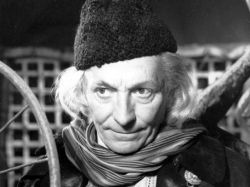 Sometimes Dr No has wacky ideas. One of his favourites is that all of time has already happened. Like a film in a can, it is all there, beginning to end; and, like a film, we see it sequentially, frame after frame, and that is what gives us the illusion of movement, and of the arrow of time. Sometimes he goes a little further; and, seeing the film strips lying in coils side by side on the reel, wonders whether we might, just might, if the conditions were right, be able to read the film not sequentially on the strip, but radially, on the axis of a spoke, and so be able to see, perhaps even move, backwards and forwards in time.
Sometimes Dr No has wacky ideas. One of his favourites is that all of time has already happened. Like a film in a can, it is all there, beginning to end; and, like a film, we see it sequentially, frame after frame, and that is what gives us the illusion of movement, and of the arrow of time. Sometimes he goes a little further; and, seeing the film strips lying in coils side by side on the reel, wonders whether we might, just might, if the conditions were right, be able to read the film not sequentially on the strip, but radially, on the axis of a spoke, and so be able to see, perhaps even move, backwards and forwards in time.
Such fancies naturally lead Dr No to an affection for his Time Lord colleague, Dr Who. Dr No, though not a Time Lord, is ancient enough to remember the very first Doctor – the wonderful William Hartnell, whose white locks so well suited the black & white television of the day. He even remembers, being younger then, hiding behind the sofa – the left hand end, since you ask; it was further from the screen – when the daleks appeared. Dr Who fast became unmissable, and the Doctor a hero to the young Dr No. Who knows – the Doctor, who embodies many of the mystical and potent qualities of the medical doctor, may even have helped to shape the young No’s decision to become Dr No.
But Dr Who’s powers, as a Time Lord, extend far beyond those of a medical doctor. His immortality, his arrival on Earth from space, and his supernatural knowledge all lend him a God-like stature. And so it is that it now seems natural that a new series, with a new Doctor, should start at Easter, itself a Christian celebration of resurrection, built on the older celebration of the spring equinox, and the renewal of life. The press releases may talk of the Doctor regenerating, but Dr No is not fooled – the regeneration is a symbol for resurrection.
It is by keying into the mystery and majesty of deity that Dr Who maintains his grip on our imagination. If the early Doctors were Old Testament – and, it must be said, some of the middle Doctors, no testament – then the later Doctors have become New Testament: less irascible, more accessible, almost more human. Davis Tennant was superb in the role; whether the new Doctor, Matt Smith, resurrected yesterday as an ABC1 version of Tennant’s Doctor, will succeed in keeping the magic alive remains to be seen.
The opening credits were weak, and the down-keyed theme tune, lacking the edginess of earlier versions, enfeebled. Nonetheless, the plot was sound enough, and program had its good moments, but it also showed signs – most notably in the swelling celestial music, but also in the ‘coming soon’ trailers, of religious inflation. Much more movement in that direction, and the show might just ascend into the Heavens, over-inflate – and explode into a caricature of itself – and that would be a great loss to British television.
